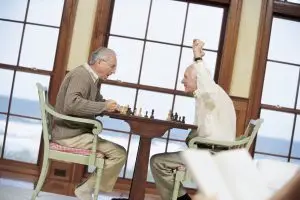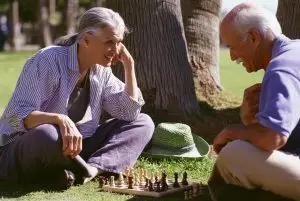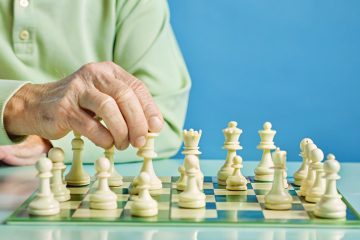Chess Therapy for Seniors : Memory and Cognitive Health Improvement
The world is now searching for various ways to support the mental and cognitive health of seniors. The most rapidly spreading and effectual way involves chess therapy for older adults. This immemorial game, full of strategy and intellectual difficulty, has the potential to give much more than simple enjoyment; it provides a serious weapon to support the rise in cognitive function and memory among the elderly.
With age, people generally tend to opt for hobbies that provide them with joy and have a positive impact on their minds. With its historic significance and intricate nature of the game, chess is fast growing as one of the most prominent activities among the elderly due to varied associated benefits. This will highly develop mental agility, problem-solving skills, and community bonding through social interaction by indulging in chess therapy for seniors.
It has been supported by many scientific studies that playing chess can benefit cognitive functioning. Some research has proved that playing chess frequently can improve memory, concentration, and delay the onset of dementia and Alzheimer’s disease. This, therefore, is very instrumental use of chess therapy for seniors in maintaining and improving brain status.
Moreover, chess is much more accessible than it was before. Any senior citizen can actuate active involvement with chess clubs locally to enjoy face-to-face interaction and friendly competition. For those placing a premium on the convenience of home, there exist a number of online platforms courtesy of which one can play against great opposition from all over the world, hence flexibility and a myriad of challenges. This also possibly avails personalized coaching where seniors will learn the game and progress at their pace with guided support tailored to their individual needs.
This article explores some of the deeper and provides practical tips on getting started, along with the scientific evidence that underscores its importance. Whether you are a senior who wants to keep your mind razor-sharp or a caregiver desiring activities beneficial to older adults, chess therapy provides an awarding, enjoyable solution. In this regard, the benefits for older adults are not restricted to improved cognitive health, memory retention, and lots more with respect to their mental wellbeing only by incorporating chess into their daily lives.
- What is chess therapy for seniors?Chess therapy for seniors refers to the use of chess as a mentally stimulating activity to enhance cognitive function and overall mental health in older adults. It involves regular engagement in chess games, puzzles, and strategic exercises to promote memory retention, problem-solving skills, and social interaction.
- What are the cognitive benefits of chess therapy for seniors?Playing chess offers numerous benefits for seniors, including:
- Improved memory and recall
- Enhanced problem-solving and critical thinking skills
- Increased attention and concentration
- Better cognitive flexibility and mental agility
- Delayed onset of dementia and Alzheimer's disease
- Reduced stress and anxiety
- Opportunities for social interaction and community building
- How does chess therapy help delay dementia and Alzheimer’s disease?Engaging in mentally stimulating activities like chess helps build cognitive reserve—a protective mechanism that allows the brain to maintain function despite age-related changes. Chess therapy challenges the brain, strengthens neural connections, and may delay the onset of cognitive decline associated with dementia and Alzheimer’s disease.
- Are there health risks associated with playing chess for long periods?Like any activity, moderation is important. While playing chess has many benefits, it's essential to take breaks, stay active, and maintain a balanced lifestyle. Prolonged sedentary activities can have health risks, so combining chess with physical exercise is ideal.
Cognitive Benefits of Chess for Seniors
Sometimes referred to as the “game of kings,” chess is not only reserved for more intellectual gentlemen or aficionados. It boasts great cognitive benefits that will nurture and improve mental health and quality of life for seniors. This complex game keeps the brain sharp, making chess one of the most valuable tools to help in maintaining and improving cognitive functions as we grow older. Let’s see in detail the specific cognitive benefits chess conveys for Seniors:.
-
Improved Memory
Probably the most essential cognitive advantage of chess in older adults is an enhanced memory. Chess contents require one to memorize various moves involved in playing the game, several strategies involved, and the position of the different pieces on the board. All this mental exercise can work wonders in developing both short-term and long-term memory. For seniors, this would translate into improved recall of everyday facts, such as names, dates, and important tasks at hand, thus bettering their independence and confidence in daily living.
-
Improved abilities in problem-solving
On the very note, chess is a game of strategies and tactics. To play chess, a player has to foresee the opponent’s move and, at the same time, plan a couple of steps ahead. At the same time, the player will engage themselves at high critical thinking levels and above that at high problem-solving skills. For seniors, playing regularly will definitely yield tremendous improvement in these skills. A boost in problem-solving abilities would literally imply the enhanced decision-making skills in doing daily activities with much ease and more confident actions.
-
Increased Attention and Concentration
Playing chess requires focused attention and concentration. One has to control the mind while considering every move; the consequences of a mistake in this game could be high, should he become less focused. For seniors, that sort of high level of attention could help them focus and concentrate better on things in general. Better concentration leads to improved performance in tasks that have a part which requires sustained mental effort.
Improved Cognitive Flexibility: This mental ability is very germane to staying mentally agile, which is the capacity to switch between different concepts or adapt when new information arises. Chess requires any player to think on his feet, adjust to the opponent’s moves, and alter his approach many times in a game. This constant mental gymnastics consequently helps strengthen cognitive flexibility and thus contributes to the mental agility of seniors, thereby better arming them against changes and adapting to new information in everyday life. Delayed Onset of Dementia and Alzheimer’s Disease:
Keeping oneself mentally active with chess and other games delays the onset of dementias, for example, Alzheimer’s disease. Chess trains the brain to a very high degree and increases cognitive reserve. This is one essential element for healthy aging of the brain, enabling it to compensate for age-related changes or other neurological damages. It is thought that active players of chess could delay the beginning of cognitive decline and neurodegenerative diseases by constantly strengthening their cognitive reserve.
Improved Social Relations and Emotional Well-Being: Though the cognitive benefits from playing chess are enormous, its social aspects should also not be demeaned. Chess can turn out to be a highly social activity. It allows seniors to spend time with others and make new friends, enable them to enjoy meaningful social activity. Social engagement is known to favorably affect mental health and cognitive function. It is possible to set up a sense of belongingness and thus gain emotional strength through membership in chess clubs, tournaments, or online chess communities, which could eventually elevate their quality of life.
-
Less Stress and Anxiety
The attention and concentration involved in chess would provide a form of mindfulness for the elderly, keeping them in the present moment, which can reduce stress and anxiety by having this sense of calm and mental clarity. Chess is a strategy-based game that keeps players logic-oriented and systematic; often, it is greatly beneficial for eliminating states of anxiety and therefore works toward improving mental health at large.

Initiating Chess Therapy
Chess therapy is one of the highest-profile activities for the elderly to cultivate mental alacrity, their cognitive health, and to be equipped with a tool of amazingly potent capability to keep providing incessant stimuli and fulfillment. Getting started, whether you are new to chess or returning to the passion of this game played in your youth, there’s nothing difficult or unrewarding. Available herein is a definitive guide on starting your chess therapy journey:
-
Understanding Basics of Chess:
Before going forward to chess therapy, it is essential to know a little about the game. Chess is played on a square-shaped board further divided into 64 squares, which were, in turn, divisible into black and white chequered squares. From all these 64 squares combined, each player has 16 pieces and own choice of using pawns, knights, bishops, rooks, a queen, and a king as per the game’s requirement. The main idea for winning the game is checkmate, which means the buying out of the king of the opposition player.
-
Progressing to a Local Chess Club:
Local chess clubs are always a good place to start for seniors interested in chess therapy. Many clubs embrace all players, regardless of age and level of skill. You will therefore get a very conducive environment in which to learn and play chess. Joining a club gives one friendly competition opportunities and hence socialization—yet another important aspect of good mental health.
-
Looking into online chess playing platforms:
Most of the benefits for those seniors who find it more convenient to play from home will be derived from online chess facilities. Environments like Chess.com, Lichess.org, and Chess24.com give absolutely free access to chess games, puzzles, tutorials, and community forums. These websites allow players of different skill levels flexibility and freedom to train at any time of the day.
-
Solve Chess Puzzles and Train with Mobile Apps:
Chess puzzles and mobile phone applications greatly help in developing chess skills and improving mental ability. These puzzles present a challenge to the player to solve certain positions or situations, thereby enhancing tactical awareness and decision-making. Most of these apps provide customized training programs and track progress. Seniors can, in this manner, build up their game according to their abilities.
-
Get Some Personalized Coaching:
Personalized coaching can work fine for seniors wanting organized guidance and improvement. Any number of seasoned chess players and coaches will be willing to provide private lessons based on the needs and level of expertise of a student. Whichever way it is done—be it in relation to a face-to-face or online version—personalized coaching provides specific feedback, strategy development, and motivation toward chess skill improvement.
-
Join Chess Tournaments:
Chess tournaments introduce some aspect of competition into the game and the chance for seniors to play against others of similar skill. These events are organized at the local level by chess clubs, while online sites provide weekly events with contestants around the globe. Not only is this exciting, but it motivizes continuous learning and self-improvement in chess strategy.
-
Creating a Caring Chess Community:
One needs a community that shares the same passion for chess in order to motivate and engage themselves. Join chess clubs around your area, talk about it on online forums or social media groups, or intersect with others sharing an interest in chess for a much better experience of learning and fittingness.
-
Embracing the Learning Process:
The games do not matter in chess therapy; it’s about embracing the learning process and continuous improvement. Give each game, puzzle, or lesson its own curious place and flexible mindset toward learning whenever you win or lose. In time, you will build strategic thinking and improve your problem-solving skills due to the cognitive benefits from chess therapy.
-
Integrating Chess into Daily Life:
Integrate chess into your daily routine to get the maximum benefits from chess therapy. This can be in the form of timing regular practice or just a few games during breaks. Any way, the continuous engagement with chess would definitely help the long-term maintenance of mental sharpness and cognitive health.


Scientific Evidence of Chess Therapy
In essence, chess therapy is strategically complex and involves an immensely strong engagement of the mind; hence, its profound impact on cognitive health, especially in seniors. Consequently, scientific research shows very strong evidence that regular engagement in chess therapy improves cognitive benefits. The following is a detailed explanation of scientific proof on the therapeutic effects of chess:
-
Memory Improvement and Better Cognitive Function:
Studies have shown that chess improves memory and cognitive abilities for seniors. According to research carried out and published by the New England Journal of Medicine, elderly people involved in mentally stimulating activities like chess showed less cognitive decline than those not doing so. This game requires memorization of the different positions and anticipation of moves; it definitely develops strategy in key areas of the brain dealing with memory retention and cognitive flexibility.
-
Problem-solving and critical thinking:
Chess has long been regarded as a game of strategy and solving problems. Investigations at leading campuses, such as the University of Sydney, have concluded that the people in old age who play this game regularly prove to be much better at processing information. Because chess is forced to consider positions, conceptualize anterior ideas, and modify strategies in response to those of their opponents, it enhances skills that translate into daily life decisions.
-
Kicking Back the Diseases of Dementia and Alzheimer’s:
Studies associate the risk of developing dementia and Alzheimer’s disease with playing chess and other mentally challenging activities. Such activities are, in fact, recommended by the Alzheimer’s Association as part of overall strategies for protecting cognitive health. Chess therapy contributes to building cognitive reserve—a protective mechanism that allows the brain to function effectively despite age-related changes or neurological damage. Studies suggest that seniors who play chess may experience a delay in the onset of cognitive decline and neurodegenerative conditions.
-
Promotion of Mental Agility and Cognitive Flexibility:
Chess requires adaptation to changes in the game, evaluation of multiple possibilities, and quick decision making—these are characteristics that Daha pública, “foster mental agility and cognitive flexibility.” These are key skills of cognition that show resilience amidst challenges to cognition and facilitate adaptation to novel information or environments while aging.
-
Psychiatric Benefits:
Beyond cognitive benefits, chess therapy has psychological benefits for the elderly. The fact that it is a structured game whose concentration is towards thinking logically helps in reducing stress and anxiety, promotes relaxation, and improves general psychological well-being. The game gives the elderly a constructive, useful, enjoyable activity to do; fibre element of self-realization of accomplishments, satisfaction.
-
Interference with Social Interaction and the Quality of Life:
Participation in chess clubs, tournaments, or online communities thus increases the social activity of seniors and reduces their isolation and loneliness. According to studies, social engagement is directly related to better cognitive functioning and an enhanced quality of life. Chess therapy thus offers mental activity with possibilities for developing friendships and mutual support founded upon common interests among older adults.
Conclusion:
Imagine a game that will entertain, sharpen your mind, improve your memory, and enhance your problem-solving skills: chess therapy for seniors. Light entertainment to keep the brain active and healthy. It is not just moving pieces on a board, but increasing cognitive health, having a good time, and experiencing a mentally stimulating journey. For seniors, the associated benefits with chess are simply enormous. Playing chess continuously improves memory, and any person can learn to remember details and information easily. It sharpens problem-solving skills since you will need to think some moves ahead and plan your strategies. It calls for attention and concentration, improving one’s focus and mental clarity on other things in life. Most importantly, perhaps, chess therapy is found to delay the beginning of dementia, thus acting as a strong instrument in the retention of healthy cognitive functioning throughout life.
You won’t have to look too hard to begin chess therapy. Local Chess Clubs provide one with a feel for the game and social interaction—playing face to face. For those who like playing from home, online Chess Sites will keep you playing against others around the globe. Other options include personalized coaching—receiving instruction from players experienced so that you can learn at your pace through the intricacies of the game as a mentor guides you.
So why not try your hand at chess? It’s never too late to start relishing these age-old benefits. Be it for the seasoned player or for an absolute beginner, chess therapy can help each one of us work towards better cognitive health and mental well-being. Including chess in your routine could launch you on a very enriching, pleasurable journey that will keep your mind sharp and stimulated. Begin your steps with this today and uncover the countless benefits of chess therapy today.



0 Comments